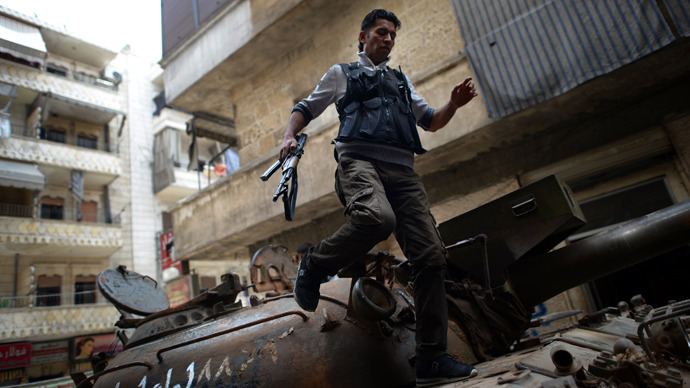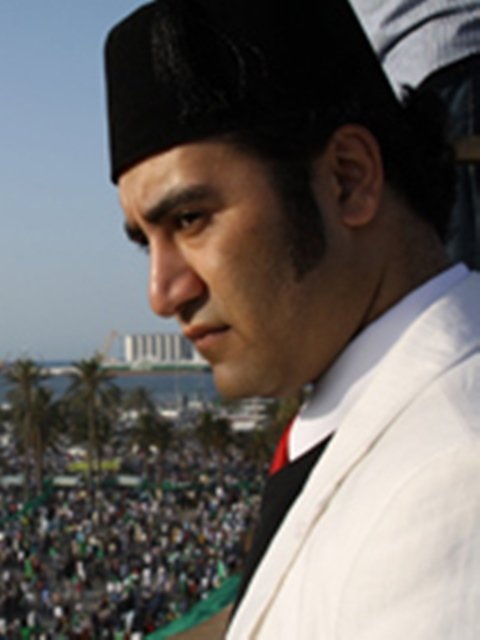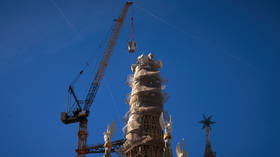The European Union and the McJihad in Syria

Interesting developments have been taking place in the European Union. Red flags are going up across the EU, with officials in the European Union and various EU member states expressing fears about their returning nationals fighting in Syria.
The red flags started going up when warnings were issued in the Netherlands about Dutch citizens going to fight in Syria. Belgium followed, then the European Police Office (Europol), the EU’s law enforcement agency that handles criminal intelligence, reported that the fighting in Syria had the potential of creating a future wave of terrorism that could threaten the European Union’s members in their EU Terrorism Situation and Trend Report (TE-SAT) for 2013. In regards to Syria, the Europol report reads: “Syria emerged as the destination of choice for foreign fighters in 2012. A number of EU nationals were arrested in Belgium, France, the Netherlands and the UK related to travelling to or returning from Syria” (TE-SAT 2013:p.22).
The EU Counter-Terrorism Coordinator, Gilles de Kerchove, then stated that about five hundred EU citizens—especially from Britain, France, and Ireland—were inside Syria fighting alongside the anti-government forces with the objective of toppling the government in Damascus. Monsieur de Kerchove would express the same concerns as Europol about these EU citizens returning to the EU from the battlefields in Syria. His concerns would be echoed in London.
Even as his government was working to legalize a transfer of British arms to anti-government forces in Syria, the British Foreign Secretary, William Hague, was warning of the threat posed to Britain from British fighters returning home from Syria. Soon afterward, Germany confirmed that German citizens were taking part in the fighting to topple the Syrian government. Earlier than this news would also come out that one Danish citizen, who was a former US prisoner in Guantanamo fighting in Syria, was killed.
The McJihad
The situation is quite a paradox. Syria is now worryingly being presented as a “failing state” and “jihadist hotbed” in the EU. The irony is that EU members—alongside their counterparts in the US, Turkey, Jordon, Saudi Arabia, and Qatar—contributed to and facilitated the entire Syrian McJihad enterprise with the ultimate aim of regime change in Damascus. For more than two years the calls to jihad against Damascus have been aired across the world by the likes of Yusuf Al-Qaradawi and other pseudo-clerics and tele-evangelists in Saudi Arabia and the tyrannies of the Gulf Cooperation Council. EU officials said nothing. Additionally, organizations like the Muslim Brotherhood, which has been recruiting fighters to go to Syria, actually work freely in London and have their longtime headquarters in Britain, as do similar organizations that are eyeing Russia and Central Asia for the next phases of McJihad.
From Taliban-controlled Afghanistan to Somalia, the so-called “failed states” are the handiwork of the US and this same group of countries that form the “Friends of Libya” and “Friends of the Syrian People” groups. These countries should more accurately be called “Imperialism Inc.” William Hague and company need only look in the mirror to find the culprits creating the terrorism threat in the EU.

The concept of “blowback” or the unintended consequences of intelligence operations is getting old. On the one hand people from countries like Britain and France, flood into Syria as fighters against the Syrian government, while on the other hand they are scaring their own populations about these fighters with their scaremongering. In most cases the foreign fighters from the EU that entered Syria were essentially given the green light and allowed by their own respective government to go fight there. The situation was the same in Libya where American, British, Canadian, French, and Irish citizens fought to topple the Libyan Jamahiriya. One American citizen from Arizona, Eric Harroun, returning to the United States from Syria would face trial for fighting alongside Al-Nusra, but his father Darryl Harroun would let the secret out that Eric was working for the CIA in Syria.
Turning Point?
A turning point is on the horizon, pointing to a renewed push
against the Syrian government. Richard Ottaway, a British MP from
William Hague’s own British Conservative Party and the chair of the
Foreign Affairs Select Committee of the British House of Commons,
announced that he believed that Hague’s announcement was tied to
British plans to openly intervene in Syria as a means of
“undermining” the foreign jihadists. In Orwellian terms, the
foreign fighters are being used as a pretext to further arm the
anti-government forces in Syria.
It should come as no coincidence that the capitals of NATO members are announcing that the nerve gas sarin was used by the Syrian government. Announcements about the use of chemical weapons by Syria have started being made in London, Paris, Tel Aviv, and Washington, DC. Despite the fact that anti-government forces have threatened to use chemical weapons, reports about the use of chemical weapons in Syria that have been given by the Syrian government to the United Nations are being politicized with objective of blaming Damascus. In a repeat of the Libya scenario, the EU has also decided to begin buying Syrian oil from anti-government forces whereas the US has sent troops to Jordon and Israel is building infrastructure for the anti-government forces and preparing to send drones into Syria via Jordanian airspace.

The foreign fighters and anti-government forces fighting in Syria have been working with the US and its allies either directly or indirectly. By now the bankruptcy of America’s so-called “War on Terror” should be obvious to most. From the get go it was not a war on terror but a “War by Terror.” Those who have been labeled as terrorists and jihadists by the US government and its allies in many cases have been America’s own foot soldiers in a slow burning imperialist war of conquest.
Onwards with McJihad
The Cold War alliance between jihadists and the Western Bloc over their anti-Soviet honeymoon in Afghanistan has been rekindled. Once again jihadist fighters are being used as foot soldiers in America’s McJihad. In a call to arms Al-Qaradawi and his ilk have declared that Russia is the number one enemy of the Arabs and Muslims. Next on their enemy list is America’s nemesis Iran. This position is politically motivated, because Al-Qaradawi had forbidden any fighting in 2010 against Russia in the North Caucasus. The audience for his revised position on Russia and animosity towards Iran includes the battalions of foreign fighters in Syria. This includes members of militant groups from the North Caucuses that have entered Syria and Lebanon to actively fight against the Syrian government in America’s McJihad. The anti-government militias in Syria have already also voiced their hostilities towards Moscow and Tehran.
The Telegraph in London, in what comes across as triumphant language by Jake Wallis Simons, would comment that the call to arms by Al-Qaradawi were the signals that a new alliance of interests was forming between the forces that the Arab Spring was bringing into power, such as the Muslim Brotherhood, and the West against an axis formed by Russia, Iran, and China. Simons would also point out that implicitly Israel too was a part of this new alliance against Moscow, Tehran, and Beijing. This would explain why the Israelis were caught spying on the Russian vessels in Tartus.
Syria will not be the end of the line for the McJihad. If Syria
falls, in one way or another through chronic instability or regime
change, the foreign fighters swarming into its territory from
around the world could use it as a keystone to target countries
like Iran and Russia. This is what happened with Libya, which has
been used as a base to shuttle weapons and fighters into Syria from
North Africa. Potentially, places like the North Caucasus Federal
District in Russia and Iran’s border provinces could see an influx
of foreign fighters and terrorist attacks. But in the near term
Lebanon will be the next line of battle if Syria should
fall.
The statements, views and opinions expressed in this column are solely those of the author and do not necessarily represent those of RT.
The statements, views and opinions expressed in this column are solely those of the author and do not necessarily represent those of RT.













